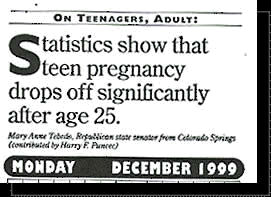The question I pose to you this week is quite simple: who do you trust the most when you are given statistics to back up an argument?
Consider the fine example to the left. While technically true, it really is useless, right? You have no other information or details to review. You are simply told that “statistics show” something, as if that should be enough for you to decide for yourself.
Another example that I see all the time is how public corporations will publish their earnings and compare themselves to the same quarter a years ago. So, you may see something like “earning were down 10% compared to a year ago”. But what you rarely ever see are some follow up facts, such as “a year ago earnings were through the roof and we made twenty billion dollars”. If you knew that a year ago the company was making record earnings you might not be worried about the 10% this time around.
So, how often do you ask for the finer details? And when listening to people give presentations or make arguments, how often do you follow-up on the facts? And when people are trolling through your databases, slicing and dicing their way in some data mining effort, how willing are you to trust their final analysis?



Personally, if I can’t find a way to verify and reproduce the data, I’m typically fairly wary. Unless it’s a sweeping statement like “All DBAs are classy, well-educated, and handsome”.
Absolutely. Statistics in isolation are completely worthless and even misleading.
For example, a number of cities can claim to be the largest city in America based on different criteria – most population, most square miles inside the city limits, etc.
I like the anonymous quote: “Unfortunately, most people use statistics like a drunkard uses a lamppost, for support rather than illumination.”
Statistics is a game onto itself. I’ve always felt you could use statistics to prove or disprove any argument. As a baseball fan this is so apparent. Player1 was 0-5 today. What? He was 3-3 yesterday! He’s also batting .290 on the season! You have to have the full composite picture. Player1’s 3-3 yesterday included a Baltimore chop the 3rd baseman mishandled, but the scorer called it a hit anyway. 2nd hit came off a pitcher making his MLB debut and was nervous. He would’ve been out on hit 3 but the ball hit the second base bag and ricochet away from the short stop. He’s also a career .239 hitter and the first four weeks of the season he was batting .375—which means he’s now working his way back to .239. What I’m trying to emphasize is I feel one should look at composite statistics to look at trends, but don’t be so acute to base a decision on just one or two just to justify your stance (and unfortunately in some cases ego).
Statistics can be warped to back up any theory. Several years ago I had stats which proved that Aaron Brooks was one of the best QBs in fantasy football.
Of more concern to me is that teenage pregnancy should drop off at the age of 20. Who are these 25 year olds claiming to be teenagers? And how I am supposed to trust the statistics of a study that considers 25 a teen?
Perhaps these were the twenty-five year old Beverly Hills 90210 type claiming to be teenagers? Was the study sponsored by the Warren Commission? There are a lot of gaps here.